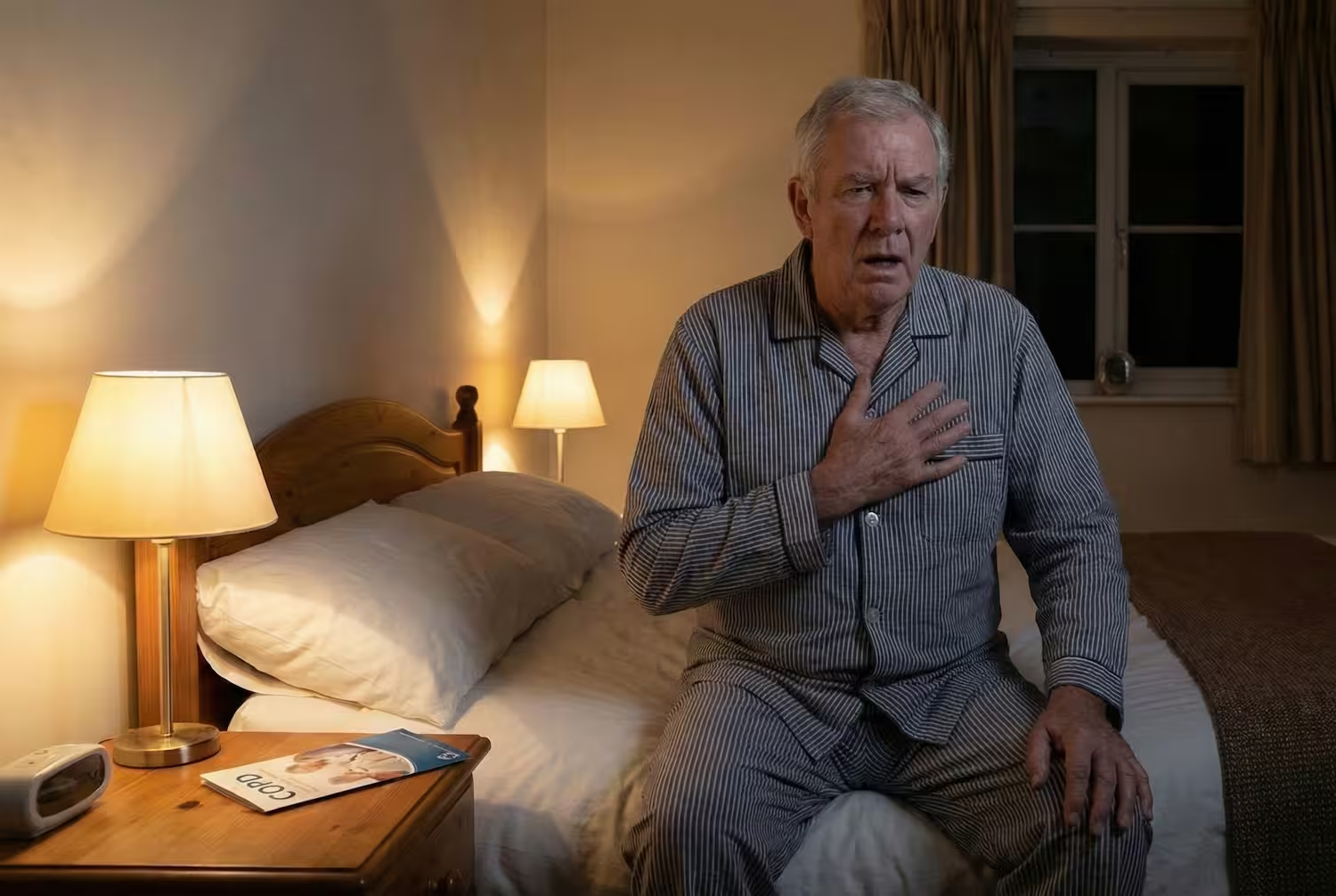.avif)
Heart failure is a serious medical condition that can progress to be life-threatening. What is heart failure, and how can you catch early signs so that you can go over treatment options with your doctor?
Carda is here to talk about heart failure today, including its causes, early warning signs, and its connection to leg cramps. Read on to support your cardiovascular health with Carda.
What Is Heart Failure?
Heart failure is a serious cardiac disease that occurs when the heart can no longer effectively pump enough blood supply to the rest of the body. The heart muscle weakens and starts to have trouble regulating blood flow through its chambers, which also affects the amount of blood that circulates to the rest of the body.
Sometimes, even as the heart fails to pump enough blood to the rest of the body, it can still make up for its less-than-optimal function. This type of heart failure, known as compensated heart failure, might not present with many signs or symptoms (or the signs and symptoms can be well-managed by a healthcare provider or cardiologist without reaching emergency status).
However, as heart failure progresses, signs and symptoms can become more urgent and may require immediate medical attention.
What Causes Heart Failure?
There are several risk factors for heart failure, including pre-existing health conditions, exposure to repeated stress, genetic predispositions, and lifestyle choices. Let’s learn more about each of these causes below.
Pre-Existing Conditions
If you already have a cardiac or other related health condition, then you are at an increased risk for developing heart failure. Cardiac conditions can cause damage to the heart muscle, which can weaken its ability to pump enough blood to circulate to the rest of the body.
A prior heart attack or coronary artery disease are two prevailing causes of heart failure. Both can cause damage to the heart muscle and can result in cardiomyopathy, which is any disease that makes it more difficult for the heart to pump blood to the rest of the body.
A heart attack, also known as a myocardial infarction, occurs when an area in the heart muscle gets cut off from blood supply and cannot receive enough blood to function properly. The longer a person waits to seek treatment for a heart attack, the more damage it can do to their heart muscle.
Coronary artery disease occurs when a section of the coronary artery walls experiences a partial or full blockage. The blockage usually comprises plaque, which is hardened, fatty deposits of cholesterol that stick to your artery walls. Without medical attention to relieve the blockage in your blood vessels, the heart fails to get enough blood supply and can incur damage.
Other health conditions that can increase your risk of developing heart failure include myocarditis (heart inflammation), heart valve disease, high cholesterol, obesity, or diabetes.
Exposure to Stress
Repeated exposure to stress is another risk factor for heart failure. Stress activates your central nervous system to release chemicals that can elevate your heart rate and blood pressure levels. These responses can make you more prone to developing cardiac conditions.
Additionally, stress can make you more likely to engage in unhealthy behaviors that can contribute to a heart condition diagnosis, such as eating an unhealthy diet, smoking, drinking, or remaining sedentary.
Genetic Predispositions
If you have a family history of cardiac conditions such as high blood pressure, heart attack, or stroke in your family, you may be at an increased risk of developing heart failure. Genes for heart-related conditions are hereditary and can be passed down from generation to generation.
When you see your doctor for your routine physical exam, be sure to mention if you have any family history of heart diseases or conditions. They may order some blood tests or other labs. They may also refer you to cardiology for electrocardiograms, echocardiograms, and other tests that can help rule out a heart disease for you.
Lifestyle Choices
Lifestyle choices such as not eating a heart-healthy diet, not staying physically active, or drinking excess caffeine or alcohol, can place you at an increased risk for heart disease that could lead to heart failure. A diet that lacks enough fruit and vegetables and is high in sodium and processed and refined foods can make you more prone to developing a cardiac health condition.
Not getting enough physical activity can also make you more prone to developing a heart condition, as can drinking stimulants like caffeine or alcohol, which can affect your heart rate and make you more susceptible to damage your heart in the long term.
What Are Some Early Signs of Heart Failure?
Early signs of heart failure include general fatigue, shortness of breath, difficulty exercising, leg cramps, and coughing or wheezing. Let’s take a look at each of these symptoms of heart failure below.
General Fatigue
Heart failure can cause general fatigue because the organs and tissues in your body are not getting adequate blood flow.
With diminished circulation, you can feel more tired in completing day-to-day activities and might notice that you do not have as much energy to do the things you want to do. You may also notice that you wake up feeling exhausted, even if you slept well.
Shortness of Breath
Heart failure can also cause shortness of breath because the cardiovascular system and the respiratory system are closely related. The two organs rely on each other because the heart supplies blood to the lungs, and the lungs supply oxygen-rich blood to the heart.
When you start to develop heart failure, the weakening cardiac muscle also diminishes the blood supply to the lungs, which can make the lungs function at a less-than-optimal level. Poor blood flow supply to the lungs can result in shortness of breath, which usually makes it feel like you have to take more rapid, shallow inhales to breathe in enough air.
Shortness of breath will often start out only presenting upon exertion but can progress to start presenting at rest. If you experience shortness of breath that progressively worsens over time, this could be a sign that your heart failure is worsening.
Difficulty Exercising
Because heart failure can cause shortness of breath and diminish blood flow circulation throughout the body, you may have trouble exercising. Shortness of breath upon starting physical exercise is a common symptom that you have a heart-related condition.
If you start to notice that you have trouble breathing even while lightly exerting yourself, such as while on a walk, then it’s time to talk to your healthcare provider to develop a plan to address this symptom.
Leg Cramps
Leg cramps can feel like a sudden and unexpected tightness in your leg muscles. Often, leg cramps will present in your lower leg — particularly in your calf muscles — and can come on suddenly and painfully as tense muscle contractions.
Leg pain and muscle cramps can last anywhere from a few brief seconds to a few minutes. They can make it hard to walk or move through the uncomfortable tension and pain, but stretching out the muscles as they cramp can help the feeling to resolve on its own.
Coughing or Wheezing
Heart failure can also lead to a buildup of fluid in the lungs and other areas like the abdomen, ankles, and feet. The inadequate blood supply can cause congestion to accumulate in the lungs, which can cause other reactionary symptoms such as coughing or wheezing.
Coughing or wheezing might present occasionally at first but can worsen over time as more congestion builds up in the lungs.
How Are Leg Cramps and Heart Failure Related?
Sudden tightness or contraction in your leg muscles can be an early sign of heart failure. Poor blood flow to the leg muscles may often cause increased tightness as they fail to get enough blood supply to function optimally.
Leg pain and cramps can sometimes cause blood clots too, which can also place you at a higher risk for progressing a heart disease.

How Do You Know If Your Leg Cramps Are Something Serious?
If you notice that you have trouble walking because you experience leg pain, bring this up to your healthcare provider or cardiologist as soon as you can. Additionally, if your leg cramps coincide with discoloration, bruising, and soreness that takes a long time to heal, these are also symptoms to bring up to your doctor.
If you think that your leg cramps could be a symptom of an underlying heart condition, then talk to your healthcare provider today about getting a referral for a cardiac rehabilitation program.
Carda’s fully virtual rehab program offers guided exercise plans monitored by an expert exercise physiologist, as well as education and lifestyle changes that can help you manage your heart disease. All you need is a physician referral and a few minutes to fill out a simple online form before your journey to better heart health can begin.
The Bottom Line
Heart failure is a medical condition that occurs when the heart weakens so much that it can no longer pump enough blood efficiently to the rest of the body. Because heart failure results in poor blood flow and inadequate circulation, it can cause leg cramps.
Leg cramps that persist despite inactivity or that are frequently present when you walk or exercise can be an early sign of heart failure. If you experience leg cramps that do not go away or that worsen over time, talk to your healthcare provider about diagnosing an underlying cause so that you can continue to support your heart health and overall wellness.
Sources:
Heart Failure | American Heart Association (AHA)
Night leg cramps Causes | Mayo Clinic
Muscle Spasms (Muscle Cramps): Causes, Pain Relief & Treatment | Cleveland Clinic







